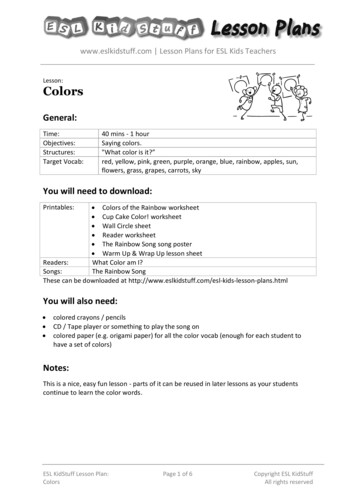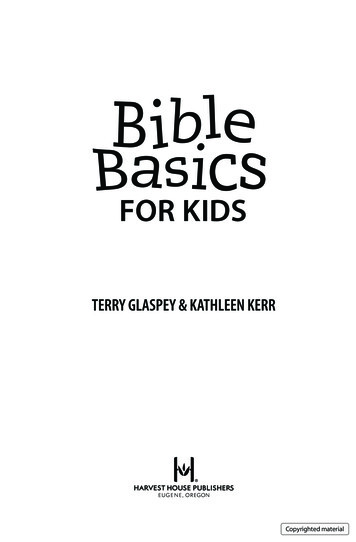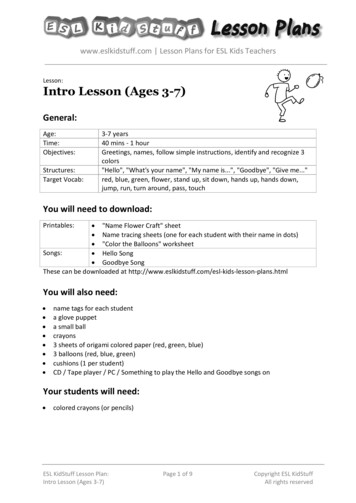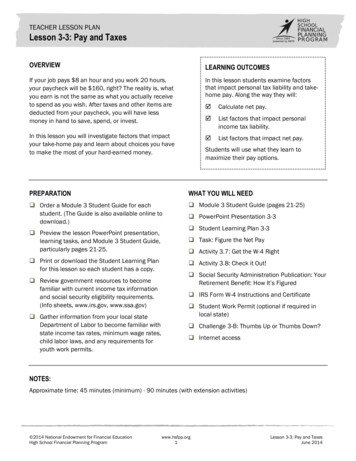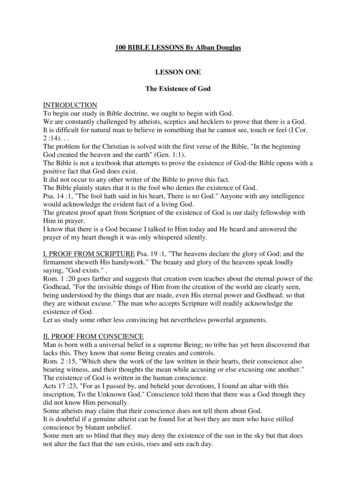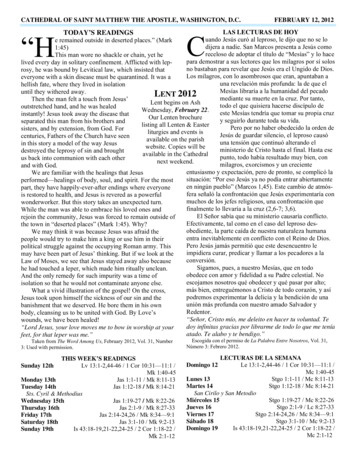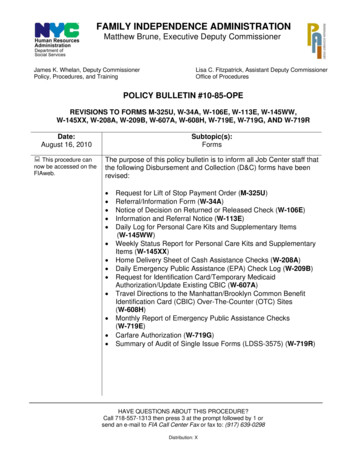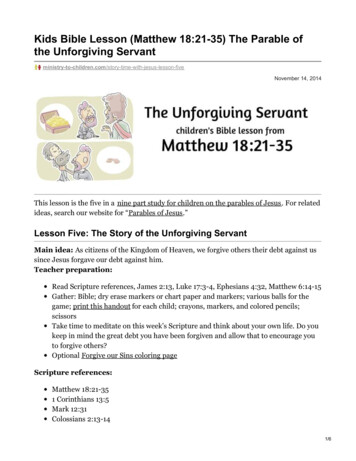
Transcription
Kids Bible Lesson (Matthew 18:21-35) The Parable ofthe Unforgiving sus-lesson-fiveNovember 14, 2014This lesson is the five in a nine part study for children on the parables of Jesus. For relatedideas, search our website for “Parables of Jesus.”Lesson Five: The Story of the Unforgiving ServantMain idea: As citizens of the Kingdom of Heaven, we forgive others their debt against ussince Jesus forgave our debt against him.Teacher preparation:Read Scripture references, James 2:13, Luke 17:3-4, Ephesians 4:32, Matthew 6:14-15Gather: Bible; dry erase markers or chart paper and markers; various balls for thegame; print this handout for each child; crayons, markers, and colored pencils;scissorsTake time to meditate on this week’s Scripture and think about your own life. Do youkeep in mind the great debt you have been forgiven and allow that to encourage youto forgive others?Optional Forgive our Sins coloring pageScripture references:Matthew 18:21-351 Corinthians 13:5Mark 12:31Colossians 2:13-141/6
Game: How Many Times?Ask the children how many times they can do various tasks. “How many pushups can youdo? How many times can you bounce a ping pong ball on a paddle? How many times canyou bounce a hacky sack off your knee? How many free throws can you score in a row?”Have the children attempt these tasks. Ask if anyone can complete these tasks 490 times ina row without messing up. Let them try. The point of the game is to show that it is nearlyimpossible to do something 490 times. This idea ties in with today’s lesson. The exactactivities you do don’t matter, as long as they get the wiggles out of the kids and show themhow hard it is to do something 490 times.Bible Lesson Message:Open in prayer, then say, This is our fifth week learning all about the parables. As youremember, parables are stories Jesus told to teach us important lessons about theKingdom of Heaven. From them, we learn what Heaven is like, what God is like, and whatwe should do as citizens of Heaven. We learned in the Story of the Soils that the message ofthe Kingdom of Heaven will be received differently by different people. In the story of theWheat and Weeds and the story of the Fishing Net, we learned that when Jesus returns, hewill separate those who believe in him from those who don’t, so it’s our job to tell everyoneabout his love. We learned that even the little things we do make a big difference in theKingdom of Heaven in the Story of the Mustard Seed and the Story of the Yeast. In theStories of the Hidden Treasure and the Pearl, we learned that the Kingdom of Heaven isworth more than anything in this world. The parables remind us that we represent theKingdom of Heaven, we represent Jesus, everywhere we go in the world. In today’s parable,we will study one characteristic of citizens of the Kingdom of Heaven. We will learn oneway that we are supposed to behave as Christians. Follow along with me as I read fromMatthew 18:21-35.21 “2/6
21 “ThenPeter came to him and asked, “Lord, how often should I forgive someone who sinsagainst me? Seven times?”22 “No, not seven times,” Jesus replied, “but seventy times seven!23 “Therefore, the Kingdom of Heaven can be compared to a king who decided to bring hisaccounts up to date with servants who had borrowed money from him. 24 In the process, oneof his debtors was brought in who owed him millions of dollars. 25 He couldn’t pay, so hismaster ordered that he be sold—along with his wife, his children, and everything he owned—to pay the debt.26 “But the man fell down before his master and begged him, ‘Please, be patient with me, andI will pay it all.’ 27 Then his master was filled with pity for him, and he released him andforgave his debt.28“But when the man left the king, he went to a fellow servant who owed him a fewthousand dollars. He grabbed him by the throat and demanded instant payment.29 “His fellow servant fell down before him and begged for a little more time. ‘Be patientwith me, and I will pay it,’ he pleaded. 30 But his creditor wouldn’t wait. He had the manarrested and put in prison until the debt could be paid in full.31“When some of the other servants saw this, they were very upset. They went to the kingand told him everything that had happened. 32 Then the king called in the man he hadforgiven and said, ‘You evil servant! I forgave you that tremendous debt because youpleaded with me. 33 Shouldn’t you have mercy on your fellow servant, just as I had mercy onyou?’ 34 Then the angry king sent the man to prison to be tortured until he had paid his entiredebt.35 “That’s what my heavenly Father will do to you if you refuse to forgive your brothers andsisters from your heart.”Let’s start with the conversation that takes place just before this parable. Peter asks Jesushow many times he is supposed to forgive someone who sins against him, who doessomething wrong to him. Peter guesses that seven times should be enough. It seems like astrange number to pick out, doesn’t it? It also seems like a lot of times to forgive someonewhen they keep sinning against you. Imagine you are playing soccer with a group, and yourbest friend keeps stealing the ball from you. You hardly get to play because they are beingsuch ball hogs! But every time your best friend steals the ball, he at least says he’s sorry. Idon’t know about you, but by about the third or fourth time that happens, I don’t think Iwould want to play soccer anymore. What do you think? (Give students a moment to share.They will surely come up with their own experiences of slights and grudges that theyshould keep in mind for the rest of the lesson.Remind them not to share names or specifics, as that would be gossip and would hurtanother’s feelings.) Peter probably thought he was being very generous by saying he couldforgive someone seven times. A lot of Rabbis, who were the Jewish religious teachers at thetime, said that it was plenty to forgive someone three times. Most people in Jesus’ timethought that if you forgave someone three times and they still wronged you, that you would3/6
not have to forgive them. So with that in mind, Peter’s guess that forgiving someone seventimes seems awfully kind. But Jesus has a different idea of what forgiveness looks like.How does Jesus respond to Peter in verse 22 of Matthew 18? (Allow a student to respond.)Jesus says we must forgive them seventy times seven times! Let’s do a little math to figureout exactly how many times that is. (Work out this multiplication problem briefly on theboard, or have the older students figure it out.)Seventy times seven is 490! Now that is a lot of times to forgive someone. Think of ourstory of playing soccer with our friend, or a time in your own life where someone keptsinning against you and hurting your feelings. Can you imagine forgiving them 490 times?In our game, it was nearly impossible to do any task 490 times in a row. It’s not likely wecould forgive someone 490 times and still be kind to them and not be bitter or angry withthem.But do you think that is really what Jesus means? Do you think he really wants us toforgive people exactly 490 times, and then we stop forgiving them? I don’t think so.For one thing, that would be really hard to keep track of. I would have to keep a littlenotebook with people’s names in it, and little tally marks for every time I forgive them.(Demonstrate tally marks on the board.) Jesus does NOT want us to do this. The Bible tellsus in 1 Corinthians 13:5 that love keeps no record of wrongs. As Christians, we loveeveryone. Jesus told us in Mark 12:31 that we are to love our neighbor as ourselves. So if welove everyone, and keep no record of wrongs, then we shouldn’t be keeping tally marks ofthe number of times we forgive someone, should we? That is literally keeping a record ofthe wrong things they do against us.So if Jesus does not want us to literally forgive 490 times, what do you think he means?(Allow a student to answer.) Jesus gives this really big number for two reasons. One is totell us that we should forgive endlessly. We can’t keep record of wrongs, we can’t tally upthe number of times we must forgive. We cannot keep track of the number of times weforgive. We must keep forgiving and forgiving and forgiving, no matter what, even if itmeans forgiving more than 490 times! The other reason he gives us such a big number is totell us that we cannot forgive endlessly on our own. We need Jesus to help us forgive. SoJesus sets up this parable, the Parable of the Unforgiving Servant, by telling us that wemust forgive endlessly.Now let’s look at the parable itself. There are three main characters. Who can tell me whothey are? (Allow students to answer.) That’s right, we have the king, the servant who owedthe king a big debt, and the servant who owed the first servant a small debt. (Write thesecharacters on the board.) The king decided he wanted to settle his accounts. This meansthat he wanted everyone who owed him money to pay him back. So he calls in this oneservant who owes him A LOT of money. the original language says this servant owed theking ten thousand talents. This was a type of currency used at the time. One talent was4/6
equal to about 6,000 denarii. A denarii is what a worker got paid for one day of work. So Idid the math on this one and to pay off his debt to the king, this servant would have to workevery day for 164, 383 years. So obviously, this man owes the king a debt that cannot bepaid. Does that sound familiar? Let’s think of this parable in spiritual terms. Who does theking represent? (Allow a student to answer.) That’s right, the king is God. (On the boardnext to “king,” write “God.” And who is the servant who owes the king a big debt? (Allow astudent to answer.) Yes, we are the servants who owe the king a big debt. (On the board,write “us” next to “servant who owes the king a big debt.”)Now of course we haven’t borrowed money from God. The debt we owe is not financial, it isnot material. The debt we owe God is spiritual. Let’s have a sword drill to see what the Biblehas to say about our debt to God. Take your fingers and bookmarks out of your Bibles andhold them over your head. When I say go, look up Colossians 2:13-14. Go! (Read, or have astudent read Colossians 2:13-14.) “13 You were dead because of your sins and because yoursinful nature was not yet cut away. Then God made you alive with Christ, for he forgave allour sins. 14 He canceled the record of the charges against us and took it away by nailing itto the cross.” These verses tell us that we have a record of charges, or a list of things we oweGod. We owe him because we sinned against him. Our sin has separated us from God, andwe need to be made right with him. The problem is, we can never pay back our debt toGod. Romans 6:23 says, “For the wages of sin is death.” Thankfully, Jesus died in our placeand paid our debt to God. So Romans 6:23 goes on to say, “but the free gift of God is eternallife through Christ Jesus our Lord.” Since Jesus has paid the debt that we owe God, we canhave eternal life. We are free from the costs of sin, from the debt that we can’t ever pay!How should this make us feel? (Allow students to answer.)We should be grateful, and very, very happy! How do you think the great debtor in ourstory should have felt? He should be grateful and very, very happy too! Is that what thestory says, though? Nope.What does the debtor who owed the king more than he could ever pay do after beingforgiven his huge debt? (Allow a student to answer.) Our parable says he went out to afellow servant who owed him a much smaller amount and violently demanded that he paythe debt. This fellow servant owed 100 denarii, which is 100 day’s worth of work. Whencompared to the 164, 383 years worth of work the first servant owed the king, a fewmonth’s worth is practically nothing. Who, spiritually speaking, is the servant who owedthe small debt? (Allow a student to answer.) He’s anyone who owes us anything. (Next to“the servant who owed the small debt” on the board, write “others.”) Of course I don’t justmean people who owe us money. The fellow servant is the person who did somethingwrong or hurtful to us, and they owe us an apology.Is it easy to forgive people who do wrong to us? Of course it isn’t. That is why we needJesus to help us forgive.5/6
The end of this parable is a tough warning. What happened to the servant who owed theking an unpayable debt, after the king discovered he was unwilling to forgive his fellowservant? Matthew 18:34 tells us, “the angry king sent the man to prison to be tortured untilhe had paid his entire debt.” As we said, this man can never pay this debt. That means hewill spend the rest of his life being tortured, all because he would not forgive as he hadbeen forgiven. Jesus goes on to say in verse 35, “That’s what my heavenly Father will do toyou if you refuse to forgive your brothers and sisters from your heart.” If we don’t forgivepeople, it means we deserve the punishment of hell. Now let’s be clear here. We are stillsinners. Sometimes we will mess up and not forgive people. This DOES NOT mean we willgo to hell. If we believe in Jesus and do our best to follow him, then we will go to Heaven.Forgiving others is not a way to earn a place in the Kingdom of Heaven, it is evidence thatwe have a place in the Kingdom of Heaven. As citizens of the Kingdom of Heaven, weforgive others their debt against us since Jesus forgave our debt against him.End in prayer.Craft: Mini Book (Download here)Every week, students will make a mini book that retells the parable in very basic terms.This fifth mini book in their library reminds the kids how to forgive like citizens of theKingdom of Heaven. To begin, demonstrate how to fold the book. Fold along the solidlines. Start by folding the long side to the long side. Crease well. Keep it folded, then fold inhalf, crease well, and fold in half again, creasing well. Now unfold it all the way and fold itin half short side to short side, so the dotted line in the center is folded in half. Cut alongthis dotted line. Do not overcut! Now unfold the paper and fold it in half again, this timelong side to long side. Now for the tricky part. Pinch both short ends of the paper, with thecrease facing up. Bring your hands together, causing the cut in the middle of the paper toopen up. You should have a plus sign now. The last step is to press all the pages down sothe cover is on top. Mush the pages down and crease all the folds. You may need to use amarker or pencil for these creases, as they are all now stacked up on each other. Now thatyou have a little book, have the kids write their name on the cover. Read each page andhave the children illustrate it accordingly.6/6
God forgives the unpayable debt of oursun when we believe in and follow Jesus.3times.” This means we are supposed toforgive endlessly, with the help of Jesus.2happened. 32 Then the king called in the man he hadwent to the king and told him everything that had1unpayable debt. This reminds us of howhim, Jesus replies “seventy times sevenforgives a servant who owes him an29 “His fellow servant fell down before him anddecided to bring his accounts up to date with servantsforgiven and said, 'You evil servant! I forgave you thatsince Jesus forgave our debt against him.should forgive someone who sins againstMatthew 18:21-35begged for a little more time. 'Be patient with me, andwho had borrowed money from him. 24 In thetremendous debt because you pleaded with me. 33forgive others their debt against us21 “Then Peter came to him and asked, “Lord, howJesus then tells a story where a kingoften should I forgive someone who sins against me?wait. He had the man arrested and put in prison untilI will pay it,' he pleaded. 30 But his creditor wouldn'tWhen Peter asks Jesus how many times heSeven times?” 22 “No, not seven times,” Jesusprocess, one of his debtors was brought in who owedShouldn't you have mercy on your fellow servant, justreplied, “but seventy times seven! 23 “Therefore, thehim millions of dollars. 25 He couldn't pay, so hisas I had mercy on you?' 34 Then the angry king sentother servants saw this, they were very upset. Theymaster ordered that he be sold—along with his wife,the man to prison to be tortured until he had paid histhe debt could be paid in full.31 “When some of thehis children, and everything he owned—to pay theKingdom of Heaven can be compared to a king whobegged him, 'Please, be patient with me, and I willdebt.26 “But the man fell down before his master anddo to you if you refuse to forgive your brothers andentire debt. 35 “That's what my heavenly Father willministry-to-children.comsisters from your heart.”pay it all.' 27 Then his master was filled with pity forhim, and he released him and forgave his debt.28 “But when the man left the king, he went to afellow servant who owed him a few thousand dollars.He grabbed him by the throat and demanded instantpayment.Name:The Parable of theUnforgiving ServantLesson FiveStory Time With JesusAs citizens of the Kingdom of Heaven, we4that his fellow servant pay the little debt.servant owes him, the servant who wasforgiven the great debt by the king demandsdebt is not grateful to the king. Instead ofgoing out and forgiving the little debt a fellowThe servant who was forgiven the unpayableBecause he was not willing to forgive the debtof his fellow servant, the king took the man hehad forgiven and had him thrown into prisonwhere he was tortured for the rest of his life.If we do not forgive others, God won’t forgiveus. When we forgive, it does not earn us a placein the Kingdom of Heaven, it is evidence that wealready have a place in the Kingdom of Heaven.56
“Have Mercy!” Bible CraftIdeas for Forgiving OthersThe lesson for the parable of the unmerciful servantfocuses on how we offer mercy to one another. We wantto impart to students the importance of forgiveness, andhow it breaks the chains of discontent and wipes ourslates clean. These crafts emphasize the “infinite number”of times we should forgive, and also remind children that mercy can set us free and erase thewrongs that we sometimes do.Bible Verses or Craft Captions to Consider “Then Peter came to Jesus and asked, “Lord, how many times shall I forgive my brother orsister who sins against me? Up to seven times?”22Jesus answered, “I tell you, not seven times, but seventy-seven times.-Matthew 18:21-22Let us then approach God’s throne of grace with confidence, so that we mayreceive mercy and find grace to help us in our time of need. -Hebrews 4:16For if you forgive other people when they sin against you, your heavenly Father will alsoforgive you. 15 But if you do not forgive others their sins, your Father will not forgive yoursins. -Matthew 6:14-15Forgiveness breaks our chains!Mercy it erases sin!Forgive others as God forgives You.More than Seventy Times Forgive!More Teaching Helps You can watch a demonstration video of these crafts on our YouTube page. We add new Bible lessons, children’s sermons, and Sunday School craft ideas every weekbased on the current church calendar reading schedule.Copyright Ministry-To-Children.comPermission granted for any non-profit use. Written by Kristin Schmidt.
Craft one: “Seventy and then Some”You will need: Stickers or other smalldecorative items Glue or tape Construction paper Markers or crayons Verse caption or extradecoration (optional)Procedure:1. Decorate the paper with averse caption depicting thenumber “70” in somesense.2. Practice counting (or useup time!) by counting toseventy: use small candies,stickers, tick marks, dots,or other decorations tocount up to seventy on theconstruction paper.3. Remind students that weare to forgive people notjust 70 or 490 times, but again and again. That’s what God does for us!4. Add a string or pipe cleaner if you’d like to make this into a decoration.Copyright Ministry-To-Children.comPermission granted for any non-profit use. Written by Kristin Schmidt.
Craft Two: “Forgiveness Erases Wrong”HeartYou will need: Glue and/or tape Construction paper orcardstock Scissors Caption or verse (Optional) Markers or crayons Pencils with erasers Extra decorations (optional)Procedure:1. Cut the paper into a heart shape.2. Decorate the heart with verses,stickers, colors, or other items asdesired.3. Cut a slit in the back of the heart,and insert a pencil with eraser.4. Give the heart away as a gift, orattach a hanger to use as a reminderthat forgiveness “erases” sins!Copyright Ministry-To-Children.comPermission granted for any non-profit use. Written by Kristin Schmidt.
Craft Three: “Set Free Handcuffs”You will need: Paper, cut into strips Pipe cleaners Aluminum foil Stapler Scissors Markers or crayonsProcedure:1. Decorate the paper strips if desired, adding a verse or caption.2. Staple the paper strips together to make a “chain” link.3. Add pipe cleaner “cuffs” on each side.4. Add aluminum foil to embellish wherever preferred.5. Demonstrate how to wear and then “break” the handcuffs, just like forgiveness breaks ourchains!Copyright Ministry-To-Children.comPermission granted for any non-profit use. Written by Kristin Schmidt.
These craft ideas were prepared by Kristin Schmidt, who servesat the Epiphany Lutheran Church in Castle Rock, CO. She hasshared her teaching gifts through Ministry-To-Children since2014 and now serves as our lead curriculum writer.Kristin has a professional background in elementary and preschool education. A graduate of Biola University, she holds aMaster of Education and will receive the Master of Theologydegree from Concordia University, Irvine, California, in May2020. Kristin grew up in southern California and lived the past 10 years in Georgia. She is a longdistance runner and voracious reader.Don’t miss our most popular resources. Over 400 Printable Bible Coloring PagesOver 800 Bible Lessons and Complete Sunday School CurriculumNew Children’s Sermons Object Lessons every weekDon’t miss our weekly newsletter called Sunday School Works!Church budgets are tight -- so we are creating digital curriculum that is half the cost of printedmaterial. So even when finances are limited, your teaching can make an eternal difference.It’s called the Sunday School Store . Use this coupon to save on your first order.Use coupon code to try our new premium curriculumSAVE20Click this link, discount will apply at checkoutCopyright Ministry-To-Children.comPermission granted for any non-profit use. Written by Kristin Schmidt.
master ordered that he be sold—along with his wife, his children, and everything he owned— to pay the debt. “But the man fell down before his master and begged him, ‘Please, be patient with me, and I will pay it all.’ Then his master was filled wit

